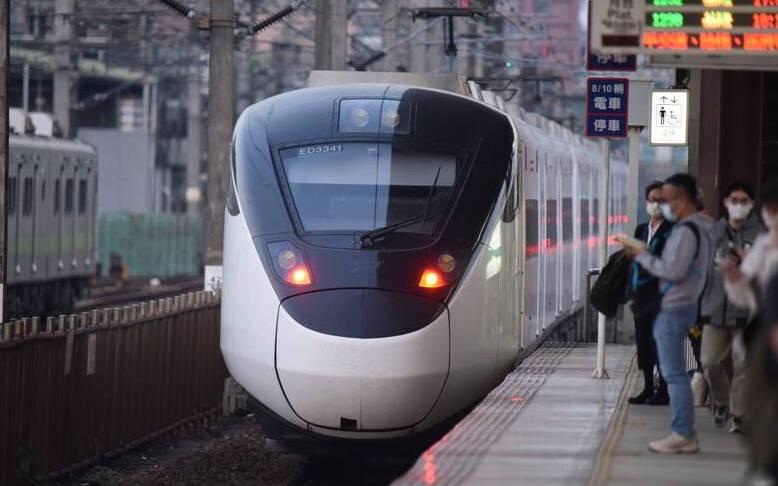New train fares are expected to take effect on June 23, after the Executive Yuan approved the Taiwan Railway Corp’s (TRC) request to increase ticket prices, TRC Acting Chairman Wu Sheng-yuan (伍勝園) said today.
The Ministry of Transportation and Communications approved the request on Feb. 21, with fares increasing by 26.8 percent on average in the first rate hike since 1995.
Rates would depend on the kind of train and the distance traveled, the ministry said, adding that fares would increase by a lower percentage the further the travel.

Photo: Wu Liang-yi, Taipei Times
For example, fares for local trains running from Taipei to Banciao (板橋) would increase from NT$15 to NT$22 (US$0.45 to US$0.66), while travel from Taipei to Hsinchu would increase from NT$114 to NT$163, it said.
Fares for Tze-Chiang Express trains traveling from Taipei to Hsinchu would rise from NT$177 to NT$253, Taipei to Hualien from NT$440 to NT$583, and Taipei to Zuoying (左營) from NT$824 to NT$975, it said.
Passengers enrolled in the TPASS program would not see any changes to pricing and would continue to enjoy unlimited rides within their program areas, the ministry added.
The Legislative Yuan’s Transportation Committee reviewed the TRC’s request and asked questions today.
Chinese Nationalist Party (KMT) Legislator Liao Hsien-hsiang (廖先翔) said he supports reasonable fare hikes.
If the economically disadvantaged have trouble, this issue should be resolved through social welfare, rather than freezing train prices and stalling the improvement of public transportation, Liao said.
However, with the global economy fluctuating violently right now, if the domestic economy encounters difficulties, the TRC should consider annual, gradual fare hikes rather than raising fares by 26.8 percent at once, he said.
Wu said that while those who take short-distance train rides would be the most affected, these people mostly use TPASS and therefore their fares would not increase.
In addition, the fare from Taipei to Banciao would only increase by NT$7, still leaving it cheaper than the MRT or public buses, he said.
Last year, the railway firm recorded a deficit of NT$13.79 billion, including about NT$10.1 billion from railway operations.
The new fares are expected to boost the company's annual revenue by more than NT$4 billion.
Meanwhile, high-speed rail fares are to remain the same for now, as traffic volumes and revenue are continuing to increase, Wu said.
After two years when new stock is purchased and costs increase would be a more appropriate time to discuss pricing adjustments for the high-speed rail, he added.
Additional reporting by CNA

The manufacture of the remaining 28 M1A2T Abrams tanks Taiwan purchased from the US has recently been completed, and they are expected to be delivered within the next one to two months, a source said yesterday. The Ministry of National Defense is arranging cargo ships to transport the tanks to Taiwan as soon as possible, said the source, who is familiar with the matter. The estimated arrival time ranges from late this month to early next month, the source said. The 28 Abrams tanks make up the third and final batch of a total of 108 tanks, valued at about NT$40.5 billion

Two Taiwanese prosecutors were questioned by Chinese security personnel at their hotel during a trip to China’s Henan Province this month, the Mainland Affairs Council (MAC) said yesterday. The officers had personal information on the prosecutors, including “when they were assigned to their posts, their work locations and job titles,” MAC Deputy Minister and spokesman Liang Wen-chieh (梁文傑) said. On top of asking about their agencies and positions, the officers also questioned the prosecutors about the Cross-Strait Joint Crime-Fighting and Judicial Mutual Assistance Agreement, a pact that serves as the framework for Taiwan-China cooperation on combating crime and providing judicial assistance, Liang

A group from the Taiwanese Designers in Australia association yesterday represented Taiwan at the Midsumma Pride March in Melbourne. The march, held in the St. Kilda suburb, is the city’s largest LGBTQIA+ parade and the flagship event of the annual Midsumma Festival. It attracted more than 45,000 spectators who supported the 400 groups and 10,000 marchers that participated this year, the association said. Taiwanese Designers said they organized a team to march for Taiwan this year, joining politicians, government agencies, professionals and community organizations in showing support for LGBTQIA+ people and diverse communities. As the first country in Asia to legalize same-sex

MOTIVES QUESTIONED The PLA considers Xi’s policies toward Taiwan to be driven by personal considerations rather than military assessment, the Epoch Times reports Chinese President Xi Jinping’s (習近平) latest purge of the Chinese People’s Liberation Army (PLA) leadership might have been prompted by the military’s opposition to plans of invading Taiwan, the Epoch Times said. The Chinese military opposes waging war against Taiwan by a large consensus, putting it at odds with Xi’s vision, the Falun Gong-affiliated daily said in a report on Thursday, citing anonymous sources with insight into the PLA’s inner workings. The opposition is not the opinion of a few generals, but a widely shared view among the PLA cadre, the Epoch Times cited them as saying. “Chinese forces know full well that